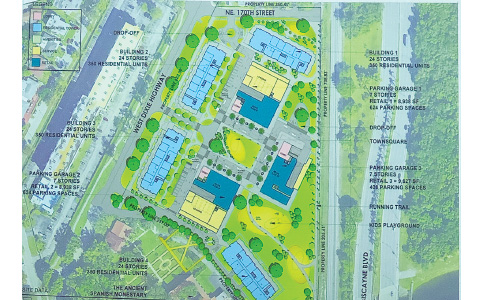Traffic speed-up contract hits slowdown, draws warning
Advertisement

County commission Chairman Oliver Gilbert III on Monday rebuked the administration and the holder of a $150 million contract that is to bring Miami-Dade 2,600 intersections with smart traffic signals. The work, which was to be largely done this year, is far behind, and Mr. Gilbert threatened legislation to cancel the job.
“This contract’s taking way too long,” he said.
Mr. Gilbert had been told that contract holder Siemans Mobility, which had been missing targets to finish the work, was in default but had made one goal in December and faced another milestone in March. Nobody specified how many intersections now use the smart signals, which are capable of rapidly adjusting traffic signal timing according to traffic conditions and speeds.
He was also told that the county plans to hire an information technology employee to work with Siemens to make the system work.
It was not the first discussion of the default and lag in installation that was held in Mr. Gilbert’s Chairman’s Policy Council, and he was clearly angry.
“I don’t believe I should have to tell you that you’re wrong in order for you to do it right,” he told county Chief Operations Officer Jimmy Morales and Josiel Ferrer-Diaz, the transit department’s chief operations and maintenance officer. “I believe when we enter agreements you should do what the agreement requires. If we have to keep coming back to you to tell you, hey, you’re supposed to do this – you didn’t,” it’s like a wife complaining about a husband who never takes out the garbage.
“What I want is to have people who are going to honor the agreements they sign without us having to check on them and without us falling behind schedule,” Mr. Gilbert said. “If we come back in March and they’re not caught up in every respect this will be a different conversation, it will be a conversation that comes by way of an item to cancel the contract, and I hope they’re in the audience to hear it.”
Some of the delay came because work on the contract signed in 2020 was briefly halted by the pandemic, said Mr. Ferrer-Diaz. Mr. Gilbert questioned that, noting that the installation in the contract is outdoors and contractors were working outdoors in the pandemic, and the information technology for the contract was being handled by software workers who can work remotely.
The transportation department said at the time of the contract signing that work would take seven years in all, but that the initial upgrade of traffic controllers should be complete within four years, with advanced improvements for 1,100 busier intersections finished in five years and detection upgrades in seven.
The department had been testing such signals since 2016, initially installing them along the Northwest 36th Street corridor before branching out and signing an $11.1 million project with Econolite Control Products Inc. for an addition of 300 smart signals along the county’s 11 busiest corridors.
Siemens was to gradually update the rest of the system.
Mr. Morales on Monday cited a learning curve in the project because of tweaks along the way.
“We’ve learned that the New York City traffic signal system is much easier than ours because we have made adjustments throughout the county, a longer light here, a slower light there. All of these mean that as you go neighborhood by neighborhood, you have to implement into the software to read all that, and that’s what has really slowed it down is the individual software packages for each set of intersections that have to then be put out in the field. You have to sort of get the software right first, and that’s what we’re trying to do with having our dedicated project managers” and then meeting with Siemens weekly.
“If it doesn’t work out,” Mr. Morales said, “we’ll have to take another process, but it looks like for now they at least made goal one. Let’s see what happens come March.”
Smart signals, the transportation department told Miami Today via email in 2020 when the contract with Siemens was signed, “are capable of rapidly adjusting signal timing according to traffic conditions and speeds. As traffic volume increases and travel speeds decrease, the system will then adjust the amount of green-light time in each direction to help traffic flow better.”
At Monday’s meeting, however, Commissioner Raquel Regalado said that part of her problem with the performance on the contract to date “is the longest yellow light ever.”
“I understand everyone’s frustration,” she said. “We’ve all wanted to get this done for a very long time and it does impact the quality of life of our residents.”
The smart signals are also to communicate with each other to “maintain optimal timing and communication,” the department said in 2020, noting that in tests on some busy county corridors this had reduced peak travel time by up to 33.3%, and Siemens models predicted the average reduction in travel time would be around 15%.
The Siemens Advanced Traffic Management System is replacing an older one by Kimley-Horn that “is now obsolete,” Mr. Morales wrote to commissioners in 2021. “After 16 years of service, there is technology now available that can improve mobility beyond the current system.”


